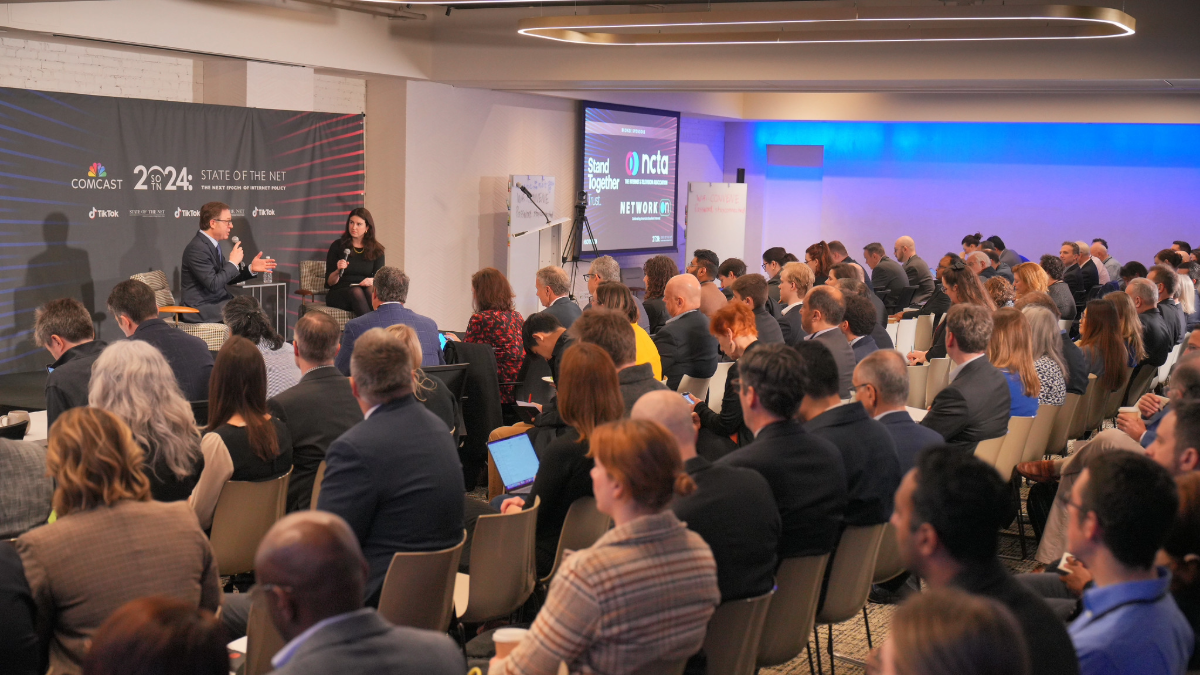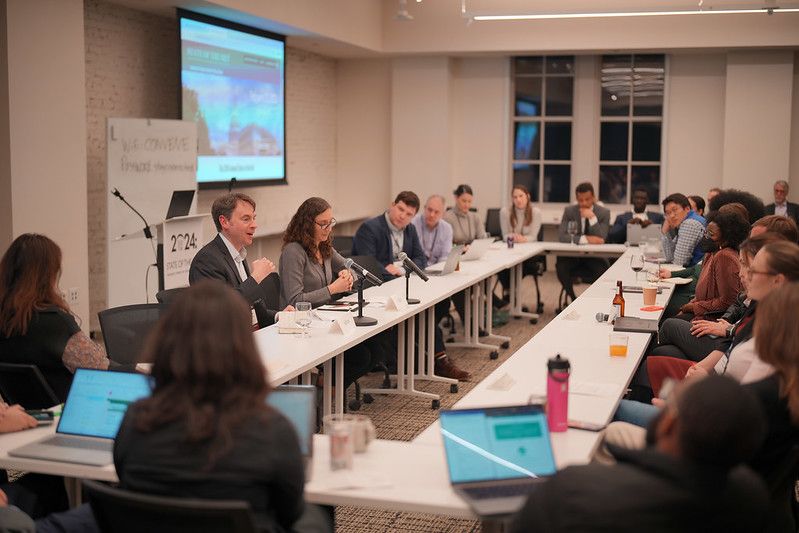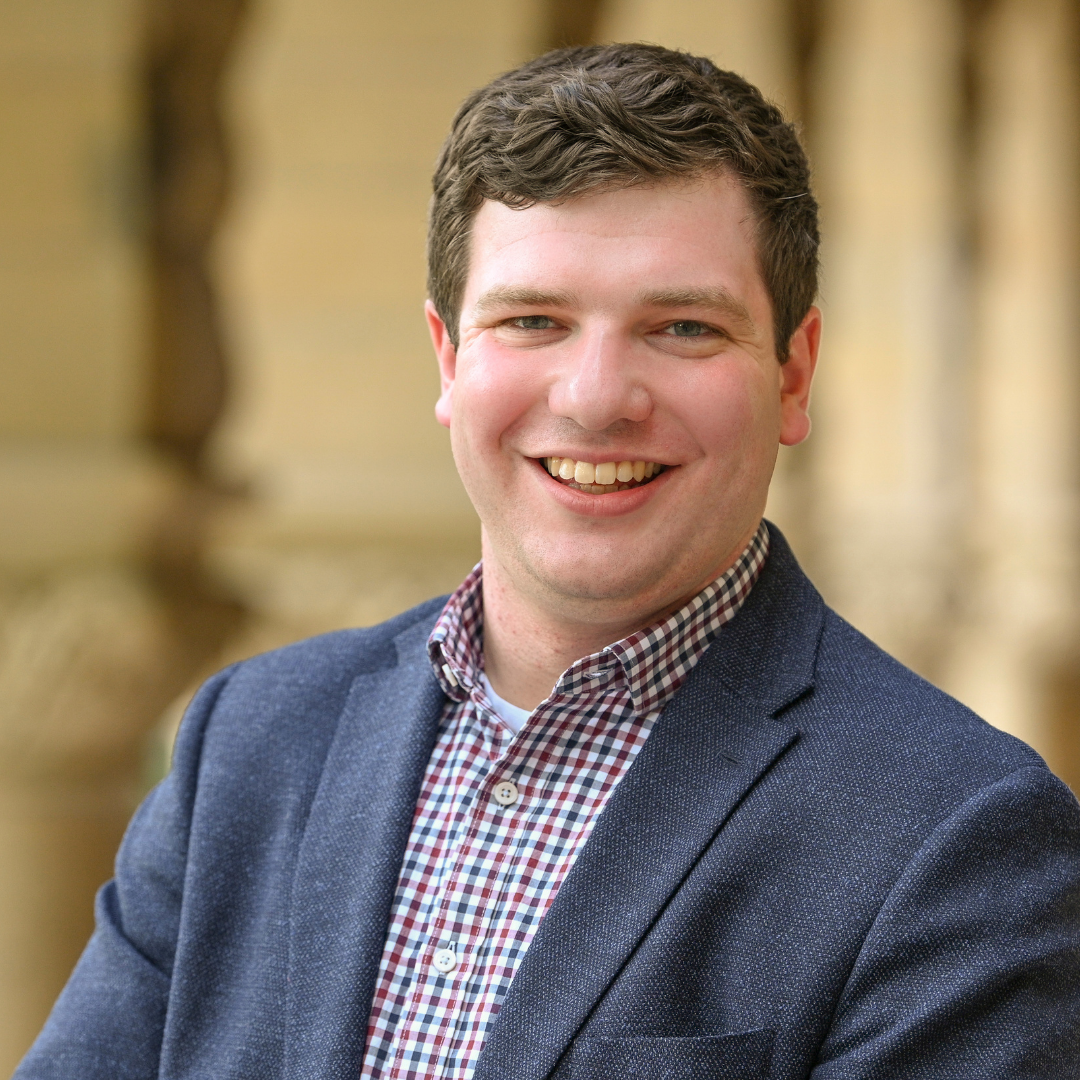AI Dominates Annual State of the Net Conference, While Some Topics Never Go Away
John Perrino / Feb 18, 2024
State of the Net 2024 Fireside Chat with Alan Davidson and Cat Zakrzewski. Internet Education Foundation
The 20th annual State of the Net, the largest internet policy conference held annually in Washington, D.C., was dominated by discussion of artificial intelligence (AI), both on stage and off. Yet other topics remain on the agenda even after two decades — including internet access, IP protections for digital content, and online safety.
At the first State of the Net in 2004, Congress was attempting to understand Web 2.0, or what we now know as social media. Harvard undergraduate Mark Zuckerberg launched “The Facebook.com” in February 2004 while Myspace grew to more than one million active users by June that year. The internet was undergoing a complete transformation less than a decade after Congress passed landmark telecommunications legislation.
Now, the internet policy world is grappling with the rapid advancement of AI, which could once again reshape the internet as we know it. Speakers from the Biden administration, members of Congress and federal regulators highlighted challenges and potential of the hottest tech buzzword.
An opening interview with Assistant Secretary of Commerce Alan Davidson framed the conference. Davidson’s National Telecommunications and Information Administration (NTIA) is tasked with advising the White House and implementing policy on everything from broadband access to supporting AI development and providing guidance and resources on children’s online health and safety.
Davidson also spoke at the 2005 conference. As a board member for the nonprofit Internet Education Foundation, he helped launch the State of the Net and in that early iteration of the conference moderated a panel on a ‘Betamax standard’ for the internet – the beloved, but largely forgotten competitor to VHS tapes.
Discussions on internet access, cybersecurity, and children's online safety are recurring topics that once again filled this year’s agenda, often framed around AI. While some internet policy debates are on a recurring loop, AI fueled record conference registration, with packed conference halls and standing-room only capacity for the convening just a few blocks away from the White House.
Everyone working on internet policy in D.C. now has to be an AI expert, and nearly every facet of life and policy is facing challenges from the rapid development and deployment of AI. Speakers covered challenges ranging from algorithmic discrimination to data privacy, and the potential of AI for business applications from cybersecurity to media creation.
“We cannot lose sight of the fact that while these very advanced generative systems are rolling out, simpler but no less consequential systems are pervading decision-making in our lives,” said Federal Trade Commissioner Alvaro Bedoya.

A session at the State of the Net 2024. Source
Assistant Secretary Davidson discussed the importance of making computing power available to independent researchers as AI is rapidly developed and stressed that current work assessing closed and open source AI model risks and tradeoffs should not be thought of as a binary, but rather on a scale.
Rep. Don Beyer (D-VA), who is working on a master’s degree in machine learning, and Rep. Glenn Ivey (D-MD) discussed the politics of AI. Rep. Beyer acknowledged dysfunction in the House, but said he is hopeful Congress can pass “four or five, maybe 10, major AI bills done this year.” He advocated for the CREATE AI Act which would make the pilot National AI Research Resource (NAIRR) a permanent National Science Foundation program providing data and computing resources for AI research.
Principal Deputy US Chief Technology Officer Deirdre Mulligan used her remarks to promote the Biden administration’s action on AI, especially the recent executive order on AI, the White House blueprint for an AI bill of rights, and the National Institute of Standards and Technology AI Risk Management Framework. Like Davidson and Rep. Beyer, she also held up the National AI Research Resource (NAIRR) as an important check by independent researchers on the industry-dominated development of AI.
Children’s online safety was also back in the spotlight, as the conference took place only a couple weeks after fireworks on Capitol Hill as social media CEOs including Meta’s Mark Zuckerberg and TikTok’s Shou Zi Chew testified before a Senate committee, with a crowd of youth and parent advocates looking over their shoulders.
NTIA’s Davidson and FTC Commissioner Bedoya are part of a Biden-Harris Administration task force developing guidance and recommendations for children’s online safety and wellbeing. Bedoya said the FTC will continue to take action addressing deceptive practices that harm children with compulsive usage and failures to have basic safety measures in place to report and address online abuse and harassment. Panel sessions discussed how to improve online safety while protecting children’s privacy and free expression.
Discussion of the digital divide – another recurring theme at the conference over the years – also loomed large. “From 20 years ago… to today, we have had a digital divide that separates the connected haves from the connected have nots in our country,” said Federal Communications Commissioner (FCC) Anna Gomez, a Democrat. She warned that the Affordable Connectivity Program (ACP) will be shut down in less than four months if Congress lets the program expire. The ACP provides more than 23 million low-income households a discount on internet access. Nearly half of those are military families and more than five million households never had access before.
One topic that seems less salient in D.C. policy circles at present is antitrust. Surprisingly, a Republican FCC, Brendan Carr, raised issues with Apple’s walled garden and actions to break a third party app that offers seamless iPhone messaging on Android phones. Carr aligned himself with former Biden White House antitrust lead and Columbia Law School academic Tim Wu and called for antitrust action by federal officials, including FCC action for internet service providers.
From the looks of the crowd at this year’s conference, the state of the internet policy community appears to be fast growing and diversifying, a welcome development as the technology permeates nearly every aspect of our lives and AI presents new risks and opportunities requiring research and diverse perspectives as policy is developed.
Authors
